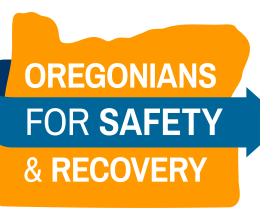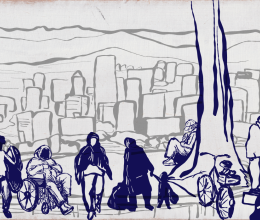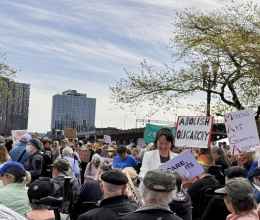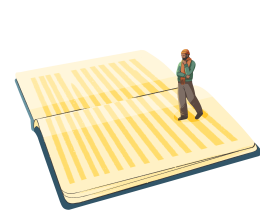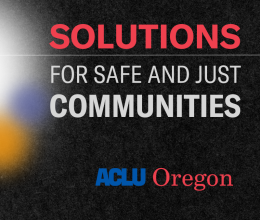
SALEM, Ore. — Today the Joint Interim Committee on Addiction and Community Safety announced that they plan to reverse the state’s public health approach to addiction and impose a criminal penalty for people not able to access treatment. Under the proposal, possession would be punishable by 30 days in jail and/or a fine of $1,250, ensuring that our addiction and homelessness crises will continue for years to come, and setting up a complicated and expensive process for people charged with possession that is doomed to fail.
Advocates for real solutions and a true public health approach to addiction gathered in Salem today to call out the utter failures of leadership and policy in the legislative proposal and demanded that lawmakers do better.
"We all want real solutions to the overdose crisis and homelessness. But what state lawmakers are proposing is an utter failure of leadership to our communities. Their proposal will make drug addiction and homelessness across our state worse, more difficult and expensive to solve. When they push forward with criminalizing people with substance use disorders — by giving them jail time and fines — the government, our lawmakers, are choosing to inflict harm and violence on vulnerable Oregonians, especially Black, brown, low-income, and rural Oregonians. Oregon's prison system is the biggest illegal drug market in our state and many folks living on the street today with drug addictions are those who were previously incarcerated in state prisons and never got the help they needed,” says Gloria Ochoa-Sandoval, Policy and Political Director at Unite Oregon Action. “We know it is less expensive over time to fully invest in the real solutions needed across Oregon – more detox, treatment, housing, non-police mobile crisis counselors, and community cleanup and revitalization efforts. But criminalizing in a state that previously prohibited Black people from living here and was built on institutional racism will always be easier, but never less costly.”
Oregonians for Safety and Recovery urges the committee to focus on what will actually work: increasing services across the board. This includes rapidly expanding peer outreach workers and treatment professionals, more investments in detox capacity, and expanding drug treatment, harm reduction programs, and housing.
According to Andy Ko, executive director at Partnership for Safety and Justice, “Treating the tens-of-thousands of Oregonians suffering from addiction as criminals is pointless, irresponsible, and profoundly wasteful. Regressive policies of the past half-century too often elevated punishment as if it were health care. We need an honest response to the health crisis we face.”
Providers who serve people in recovery say that putting criminal penalties on addiction will harm their ability to serve the people in their care. Iron Tribe Network, which receives Measure 110 funding, is a community organization committed to building community through wellness and recovery programs, including peer support and housing. They focus on family preservation and reunification. The organization provides recovery housing and peer support for individuals and families in Multnomah, Columbia, Clatsop, and Marion Counties. There is considerable demand for recovery housing. All of the homes we acquired with Measure 110 funds reached capacity in the first week of opening and are now all operating with extensive wait lists.
“When we have waitlists for services already, what is the point of threatening people with jail? Not only is it cruel and unnecessary, it will waste untold tens-of-millions of dollars in the criminal system instead of investing in housing, treatment services and the things we know will work to get people the help that they need,” says Meli Rose, Director of Operations for Iron Tribe. “When the state arrests people for drug use, they separate and displace families. We want to keep families together. When people have criminal records for addiction, they permanently exclude people from job opportunities. The legislature should delete the portions of the bill that impose criminal penalties and waste money and double down on increasing treatment funding.”
Oregonians for Safety and Recovery have identified the following issues with the legislative proposal:
- The Legislature is proposing to overwhelm our local criminal systems. Today Oregon has only 1/3 the public defenders needed to manage the current caseload. Oregon is under a federal order to release people within 7 days if there is no public defender. Criminalizing addiction would exacerbate this by adding potentially thousands more adults and youth — simply for possessing very small user-level amounts of drugs — to the already unmanageable caseloads.
- The Legislature is proposing the infliction of more government harm and violence on Black and brown communities. Black and brown Oregonians will be arrested at higher rates and be most likely to face incarceration and harsher sentencing. Today, even after Measure 110, Black Oregonians are issued M110 citations at double the rate of their population and Portland police have the 5th highest arrest rate disparities in the country. People of color are disproportionately excluded from diversion and are more likely to be placed in diversion programs that disproportionately fail people of color. In other words, more Black, brown, and Indigenous people will be convicted, get criminal records, and be incarcerated — which will lead to higher levels of drug addiction, overdose deaths, poverty, and homelessness.
- The Legislature is proposing to harm rural Oregonians and make addiction worse in our rural communities. Almost half of people in rural areas who used unlawful drugs were in prison or jail within the last six months.
- The Legislature is proposing a destructive revolving door treatment system that hurts people suffering with addiction. There is minimal treatment available for anyone, including people who are arrested. Hooper Detox turns away 200 people a month. People arrested will be charged, released, and sent back to the streets with life-damaging criminal records that make it more difficult to get housing, government assistance, jobs, and education.
- The Legislature is cruelly criminalizing homelessness and poverty — which are the result of their own policy failures. Oregon has high public drug use because we have unacceptable numbers of homeless people. The Legislature isn’t talking about going after people using drugs in their home. They are targeting people in poverty — whose private suffering is in public view. They are most vulnerable to the revolving door of despair and government harm and violence that comes from policing and arresting people with addiction.
- The Legislature is proposing spending massive amounts of taxpayer dollars on state and local governments to build out an ineffective criminal system. The proposal adds layers of exorbitantly expensive, unfunded expenses to our criminal system, which already costs Oregonians billions in tax dollars annually. Lawmakers have not shown how much all of this will cost, how they will pay for it, or how they will prevent this from defunding real solutions like treatment, housing, non-police mobile crisis counselors, and neighborhood revitalization and cleanup efforts.
- The Legislature is proposing forcing people into torturous withdrawals and increasing overdose deaths. County jails are currently seeing record deaths among people in custody — including by drug overdose — and do not have the ability to safely manage fentanyl withdrawals. After going through excruciating pain, people will be released back to the streets, which is the most dangerous time for overdose risk.
- The Legislature is giving lip service to successful treatment while setting people up to fail. Their proposal disqualifies people from expungement options if they have relapsed in the past, even though most people attempt recovery multiple times before success. 60% of people who start treatment in a given year do not complete it, whether treatment is voluntary or mandated. This could mean that a significant number of adults and youth will be incarcerated and have life-damaging criminal records because they relapse.
- The Legislature is repeating the State’s failures and creating massively expensive, overly complicated, and violent systems that have failed in the past, are not evidence based, and will delay and defund real solutions to the addiction crisis. The State failed to implement Measure 110 in a timely manner and now the Legislature proposes to throw out years of work to create new crimes and complicated bureaucracies that will take years to implement. The most recent research from Portland State University says there is no evidence that repealing Measure 110 will result in improved treatment through the criminal system because that system has never successfully connected people to treatment.
About Oregonians for Safety and Recovery:
Oregonians for Safety and Recovery (OSR) coalition members include ACLU, ACLU of Oregon, Drug Policy Alliance, Ebony Collective Coalition, Health Justice Recovery Alliance, Imagine Black, Partnership for Safety & Justice, and Unite Oregon, working collaboratively to defend Measure 110 and decriminalization while advocating for real solutions including increased investment and accessibility to drug treatment, detox, and housing services to urgently meet the full needs of people experiencing addiction.
